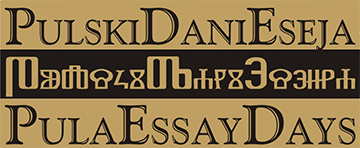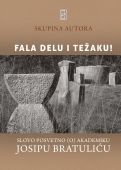Nova Istra No. 3-4/2008.

The introductory section covering the contemporary Croatian literature includes a few short pieces in prose, extracts from larger pieces in prose, and poetry by several distinguished Croatian authors belonging to different poetic expressions.
Nova Istra
Literary and Cultural Journal
Pula, Croatia, No. 3-4/2008
SUMMARY
The introductory section covering the contemporary Croatian literature includes a few short pieces in prose, extracts from larger pieces in prose, and poetry by several distinguished Croatian authors belonging to different poetic expressions and generations (S. Jendričko, I. Lukšić, S. Vukušić, etc.).
The unit entitled ‘What/Who is Črnja to Us?’ contains essays, studies, and notes about the reflections of an exquisite creative personality – presented by the figure and work of the Croatian writer from Istria, Zvane Črnje (1920 – 1991) – on his contemporaries. The texts are about Črnja, translator, anthologist, important poet, essayist, cultural activist, polemicist … about his place in the recent Croatian literature. Črnja was a smart freedom-lover, often targeted by daily politics and communist dogmatists and often in opposition to them, particularly after the fiasco of the national and socially reform-minded Croatian Spring in 1971.
The new translations refer to 11th Canto from ‘Freed Jerusalem’ by Torquato Tasso, translated from Italian by the exquisite translator, academician Mirko Tomasović, as well as to the recent poetry from the contemporary Slovene literature.
The essays presented here first comprise a text about the contemporary Croatian novelist, already having international references, authoress from Rijeka – Daša Drndić, entitled ‘Nonafiliation, Subversivity, Identity(ies), then the one about the significant 20th century author, who was born in Dalmatia, Vjekoslav Kaleb and homeland reflections in his work.
The philosophical essay is on the hermeneutics of imagination by Paul Ricour, while the theatre topic considers the phenomenon of Guignol – puppet and puppet theatre.
The homeland issues are covered by the overviews about the tram in Pula from 1904 to 1934, one of the first ones in this part of Europe.
Finally, there are also reviews of new editions in the fields of literature, translated literature, history...
Translation: Renata Šamo, Pula
Preuzmite dokument:
What to find and where? (37.5 KB)


Nada Grubišić: “RENDEZ-VOUS ili THE...
- Autor: Nada Grubišić
- Opseg: 103 str.
- Uvez: mekani
- Cijena: 13.50 €
“Priče iz Istre”
- Autor: Daniel Načinović
- Opseg: 334 stranica
- Uvez: tvrdi
- Cijena: 160 kn
“Odbljesci pamćenja”
- Autor: Ljubica Ivezić
- Opseg: 202 stranice
- Uvez: tvrdi
- Cijena: 135 kn / 18 €
“Neka buo”
- Autor: Nada Galant
- Opseg: 72 stranice
- Uvez: tvrdi, šivano
- Cijena: 65 kn / 9,50 €
“Gospa od Škrpjela”
- Autor: Daniel Načinović
- Opseg: 44 stranice
- Uvez: meki, broširano
- Cijena: 30 kn
“ISTRA ‘SPOD PONJAVE”
- Autor: Darko Dukovski
- Opseg: 406 str.
- Uvez: tvrdi, šivani, razdjelna vrpca, ilustrirano
- Cijena: 200 kn / 26,50 €
“Štorije od žalosti”
- Autor: Drago Orlić
- Opseg: 110 stranica
- Uvez: tvrdi, šivano
- Cijena: 100 kn / 14 €
“Meštar”
- Autor: Jelena Lužina
- Opseg: 111 stranica + CD
- Uvez: tvrdi
- Cijena: 100 kn / 14 €
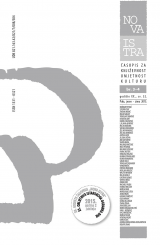
Nova Istra broj 3-4/2015.
- U sjećanje
- Suvremena književnost
- Tema: HRVATSKA KNJIŽEVNOST U SUSJEDSTVU
- Nagrada „Zvane Črnja“ za 2014.
- Novi prijevodi
- Studije, ogledi, zapisci
- U spomen: GORAN STARČEVIĆ
- Hrvati i Ukrajinci
- Prilozi o zavičaju
- Kritički pristupi i osvrti
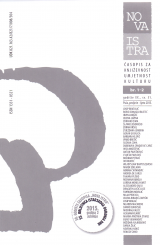
Nova Istra broj 1-2/2015.
- U sjećanje
- Suvremena književnost
- Tema: ANTUN GUSTAV MATOŠ (1873.-1914.)
- Novi prijevodi
- Studije, ogledi, zapisci
- Prilozi o zavičaju
- Kritički pristupi i osvrti
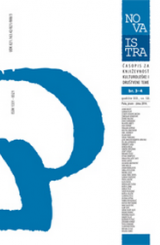
Nova Istra broj 3-4/2014.
- Suvremena književnost
- Novi prijevodi
- Tema: Optimizam
- Nagrada "Zvane Črnja" za 2013.
- Ogledi i zapisci
- Tema: Politika i političari
- Prilozi o zavičaju
- Kritički pristupi i osvrti
